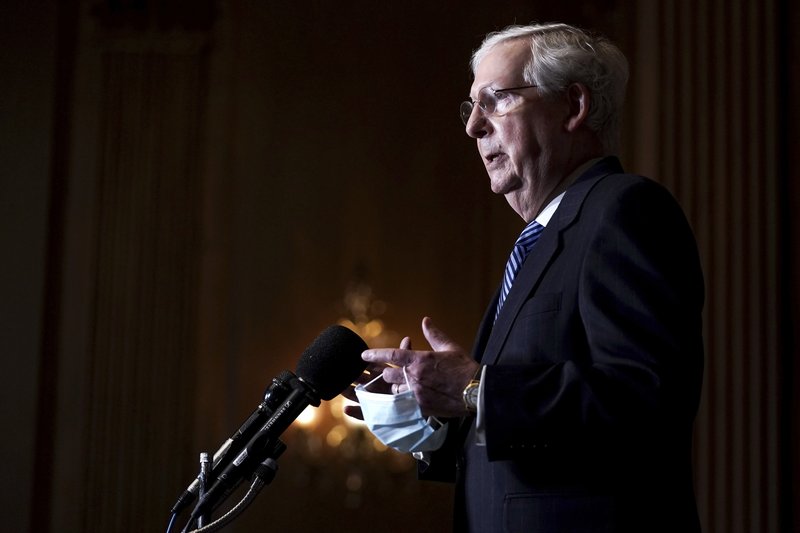Senate Majority Leader Mitch McConnell, Capitol Hill’s most powerful Republican, proposed Tuesday to shelve a controversial pet provision for an emerging COVID-19 relief package — but only if Democrats agree to set aside one of their top priorities, too.
McConnell, R-Ky., said he would drop a provision that would provide a shield against lawsuits for COVID-related negligence. In exchange, McConnell wants House Speaker Nancy Pelosi, D-Calif., to drop a demand for $160 billion or so to help states and local governments with fiscal relief.
McConnell’s offer was immediately rejected by Democrats. He had previously sent more positive signals that state and local fiscal relief would likely have to be an element of a COVID-19 relief agreement given Democratic control of the House. Prospects for a long-delayed COVID-19 aid package remain uncertain, though all sides say failure isn’t an option.
McConnell’s latest plan came as a group of pragmatic, mostly moderate senators are themselves negotiating over the two contentious issues as they seek to dislodge the long-stuck COVID-19 relief effort. Senate Judiciary Committee Chairman Lindsey Graham, R-S.C., for instance, said he’s seeking a compromise on the tricky liability shield issue.
The group of moderates, led by Democrat Joe Manchin of West Virginia and Republican Susan Collins of Maine, are seeking to rally rank-and-file lawmakers in both parties behind a $908 billion framework. It is more generous than a GOP plan that’s been filibustered twice already but far smaller than a wish list assembled by House Democrats.
McConnell said Congress will not adjourn without providing the long-overdue COVID-19 relief. He has previously said he would not put any pandemic relief bill on the floor that does not include the liability shield, which is being sought by businesses, universities, nonprofits, and others that are reopening during the pandemic.
“Leaving here without a COVID relief package cannot happen,” McConnell said. “Why don’t we set aside the two obviously most contentious issues. We know we’re going to be confronted with another request after the first of the year. We’ll live to fight those another day.”
Top Senate Democrat Chuck Schumer immediately rejected the entreaty, saying the state and local relief is sought by many Republicans, too, including some conservatives like Bill Cassidy of Louisiana and Mitt Romney of Utah. Pelosi blasted McConnell’s offer as an attempt to undercut the bipartisan group whose framework she supports as a foundation for the negotiations.
Pelosi initially demanded more than $900 billion for state and local governments this spring, but the fiscal situation in the states hasn’t been as bad as feared and Democratic leaders could be willing to accept a $160 billion proposal by the moderate group.
Meanwhile, the White House is suggesting a scaled-back, $600 direct payment to most individuals, according to GOP congressional aides. It’s probably not a coincidence that the lower payment would carry a cost comparable to the $160 billion compromise on state and local aid that GOP leaders and the White House would prefer to leave out.
Already, Capitol Hill leaders are moving a government shutdown deadline to the end of next week, but progress is slow and key decisions are yet to be made. The House has scheduled a vote on a one-week temporary government funding bill for Wednesday. Without the measure, the government would shut down this weekend.
Another wrinkle is whether to deliver another round of $1,200 direct payments to most individuals, a feature of the March COVID-19 package. The White House supports the idea — it was a key demand during talks conducted during the campaign — but it’s out of favor with many Republicans.
“Right now we’re targeting struggling families, failing businesses, health care workers and we don’t have a stimulus check to every single person, regardless of need,” Collins said.
Separately, Pelosi and Senate Appropriations Committee Chairman Richard Shelby, R-Ala., spoke by phone on Monday to try to kick start talks on a separate $1.4 trillion government-wide spending bill. That measure is held up over issues like protections for the sage grouse, the Census and accounting maneuvers being employed by lawmakers to squeeze $12 billion more into the legislation.
Two sets of talks on COVID-19 relief — on the leadership level and by a group of Senate moderates — are occurring at the same time, and it’s unclear how the negotiators might sort themselves out, lending an air of confusion to the process.
McConnell initially proposed a sweeping five-year liability shield, retroactive to December 2019, to protect companies and organizations from COVID-19-related lawsuits. Democrats, along with their allies in labor and civil rights groups, roundly dismissed that approach as a danger to workers. And there hasn’t been a wave of lawsuits.
“Contrary to the majority leader’s dire predictions, there has been no flood of COVID lawsuits. In fact, quite the opposite,” said Schumer, D-N.Y. “Far from the pandemic of lawsuits, there’s barely been a trickle.”
(AP)











